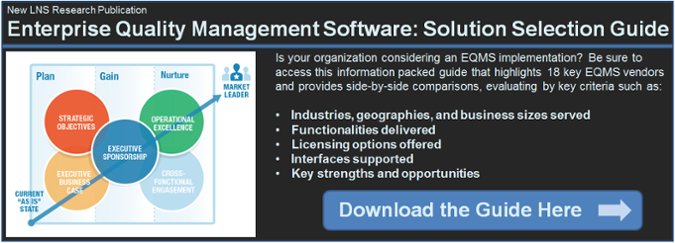This week LNS Research had the opportunity to be briefed by two solution providers that are taking a new approach to the Quality Management space. In both cases, these companies have put Risk at the center of their solutions. One described their solution as Quality Risk Management (as a subset of Operational Risk Management) and the other as Operational GRC (Governance, Risk, and Compliance).
This post is not going to be an analysis of these companies' solutions. Rather, we think their positioning is indicative of a larger trend in the overall Enterprise Software space. We will use this post to examine how manufacturing companies can get ahead of the competitive curve through embracing new concepts like Quality Risk Management.

What is Quality Risk Management?
Quality Risk Management sits at the intersection of 3 different trends that are impacting many large industrial companies today: Quality, Sustainability, and Risk. In large companies, it would not be unusual to find director or vice president level positions in charge of each of these areas. There are also a lot of similarities between these three, including:
- The reporting structures and responsibilities of people in the areas of quality, sustainability, and risk are ill-defined. Many questions still exist as to if they are best served being part of finance, the supply chain, or reporting directly to the CEO.
- The business processes managed in each of these areas are also ill-defined and generally not managed as part of a traditional ERP system.
- Other than quality, these are relatively new positions. It is likely that VP of Sustainability or VP of Risk roles were created in the last year or two and it is very unlikely they would have been around more than five years ago.
- All three can not exist in a silo. By their very definition, they impact every major piece of the value chain: product development, suppliers, manufacturing, distribution, and service.
With these four important points in mind, we can start to discuss exactly how these three areas overlap and are starting to create a specific space that can be understood as Quality Risk Management.
Quality
Although the language of risk is not always familiar to quality professionals, most of what they do and are responsible for can be understood as either risk identification or risk mitigation activities. Quality business processes like those in the below list can all be considered risk identification and risk mitigation processes by another name:
- Advanced Product Quality Planning (APQP)
- Failure Modes and Effect Analysis (FMEA)
- Supplier Quality Management
- Non-Conformances / Corrective and Preventive Actions (NC/CAPA)
Other quality business processes can also be thought of in terms of risk. Many of the quality activities that are mandated by government regulations, like those in the below list, are just risk controls put in place to mitigate already identified risks that exist in manufacturing:
When thought about this way, almost everything we do in quality is connected to risk management in one way or another.
Sustainability
Many companies have many different definitions for Sustainability but more and more there is a common understanding across the industry. LNS Research uses the following definition:
Sustainability is the set of leadership, business process, culture, and technology capabilities an organizations establishes to maintain its social license for conducting business in a particular community.
For industrial settings, these capabilities generally fall into the below buckets:
•Energy
•GHG
•Environmental
•Health and Safety
•Operational Risk
•Product Stewardship
•Reporting
Hopefully the tight relationship there between Quality and Sustainability is self evident based on the above discussions. Many of the same tools and issues that arise in quality are also used in managing Sustainability. In fact, for many companies it is still the quality department responsible for EH&S issues. It should also be noted that, as with Quality, much of what a Sustainability organization does is to manage risk. For example, improving performance in employee safety or environmental spills/releases is usually very tightly relate to reducing the risk profile of the firm in these areas.
Risk Management
Hopefully it is clear that risk management plays a big role in both Quality and Sustainability. Unfortunately, most professionals in these areas are not subject matter experts in Risk Management. For these reasons, it is important for Risk Management organizations to collaborate with Quality and Sustainability organizations. But it is also not the case that Risk Management can just focus on these areas. Risk Management organizations are concerned with identifying, quantifying, and mitigating all types of risk across an organization including: financial, security, compliance, product, operational, supply chain, and more. It is by taking a broad perspective on risk that a company can balance needs in Quality or Sustainability with the many other needs an organization has.
Quality Risk Management Definition
Based on all of the above discussion, a good first working definition for Quality Risk Management could be as follows:
Quality Risk Management is the set of leadership, business process, culture, and technology capabilities an organizations establishes to create a collaborative approach for for identifying, quantifying, and mitigating product, operational, supplier, and supply chain risks that can impact quality.
We are sure this definition will evolve as we continue to conduct research in these areas but hopefully this first pass has given you something to consider in your own exploration of these issues.
Join the webcast, on Thursday, June 16, 2016 @ 1:00 will provide senior leaders with best practices for building a business case around quality and the foundational framework needed to gain executive commitment.